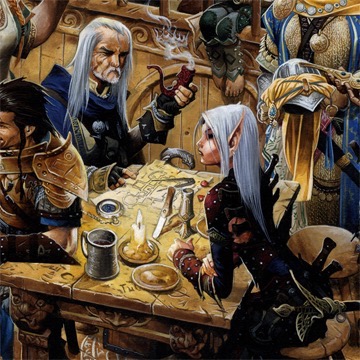Last week, we updated the Guide to Organized Play: Pathfinder Society. While we understand the timing of the update was unfortunate given my scheduled absence, we had a perfect storm of available collaborators, convention schedules, staffer movement, and blog slot vacancies. I’m passionate about my role as OPM, but I still need to take a breather and I used a limited opportunity to do so. Today we’re trying to address some of the feedback we received, in particular how to bring existing characters up to date. We plan to continue the conversations as needed, so please keep constructive criticism coming our way.
Schools
All characters with points in Spells, Scrolls, or Swords remove the points and any benefits conferred by their old School training. Then choose one of the five current options - Spells, Scrolls, Swords, Generalist, or Field Commission and apply benefits as outlined in the Year 2 Guide. Characters who choose Field Commission do not apply “extra downtime” retroactively.
Characters with points in Field Commission remove points but have no other changes.Fame/Boons
Of all the revisions, removing Boons/Fame is the biggest. We’ve gotten feedback for quite a few years that Pathfinder Society is just too convoluted and confusing to get going. After ten years of program adjustments and changes, the team agreed. Many streamlines/improvements came with the Pathfinder (second edition) ruleset and, as GMs of the campaign, organized play needed to lean into those changes. We spent hours discussing what was integral to the Society and what we could trim, and boon slotting/Fame was at the top of the trim list. The biggest reason is that we had a way to move the math/learning curve to the backside and not make it a 10-page section of the Guide. In an ideal world, we would have done this at edition change. Unfortunately, it took Covid, no traveling, and the addition of the OPA for us to have capacity to deep delve into revisions. So we decided to do it before everything settled. There will be some growing pains, but on the other side we should have a system that allows for customization for the players that want it and can be ignored by players who don’t want to engage with the system.
The conversion period has several phases.
- Phase 1: Fame Accrual. As of the start of Year 2 (31 July 2020), scenarios/quests/bounties don’t grant fame. Any chronicles issued between 31 July and 15 September that have Fame awards are grandfathered in as accurate.
- Phase 2: Boon Purchase. As of 31 December 2020, Fame boons can no longer be purchased.
- Phase 3: Game Rewards rollout. Starting 1 October 2020, boons unlocked at the Liked level are available for purchase. We will roll out Admired boons shortly and Revered after that. The delay in rollout allows for OP developers to watch the interaction between the boons and make sure we address any conflicts before adding another level. Goal is to have all boons rolled out by 31 October.
- Phase 4: Conversion. We are finishing a conversion system and will announce the particulars within the next few weeks. We hoped to have it done already, but the perfect storm above also caused issues here.
- Phase 5: New Unlocks. We will continue to monitor the program, including purchases, and may add new options at future points in the campaign.
There are two rules for Game Rewards tied to factions.
- Purchased Fame boons remain valid for use with the limitations in place when they were purchased (only one Capstone boon, for example).
- Boons with the same name have the purchase limitations as listed on the Boon tab of My Organized Play and play limitations as listed in the Guide to Organized Play: Pathfinder Society.
Home Region
Each character should choose a location as their home region. This can be as granular as a city or as broad as a nation. The home region opens up language options per page 432 of the Core Rulebook. Other rulebooks that have language options follow the same access rules. Please note that Varki is a choice if the region of origin is Land of the Linnorm Kings. A player can unlock other regional based options through the World Traveler AcP reward.
Other Clarifications
Bounties - These adventures are not part of the Pathfinder Society line of scenarios/quests, but they are produced by the Organized Play team. Thus we are able to auto-sanction them at time of production instead of issuing sanctioning documents. It is our intention that Bounties run at Society events are for PFS legal characters. GMs running Bounties outside of Society credit can choose to run in PFS mode or Campaign mode. We’ll get this language updated in the Guide shortly.
Learning Spells - Some members of the community raised questions about how their cleric and druid characters could use the new spells from the Advanced Player’s Guide. We’re happy to provide a solution! Any prepared spellcaster can use the Learn a Spell activity to learn any common spells they have access to from tutors at the Grand Lodge. This adds no additional material cost beyond the standard cost for the Learn a Spell activity.
If you missed it earlier, check out our Monthly Update blog!
Please visit us again next Thursday for more information on the Organized Play programs!
Until then - Explore, Report, Cooperate!
Tonya Woldridge
Organized Play ManagerAlex Speidel
Organized Play Associate
How to update PFS characters to Year 2 format
Thursday, October 1, 2020
